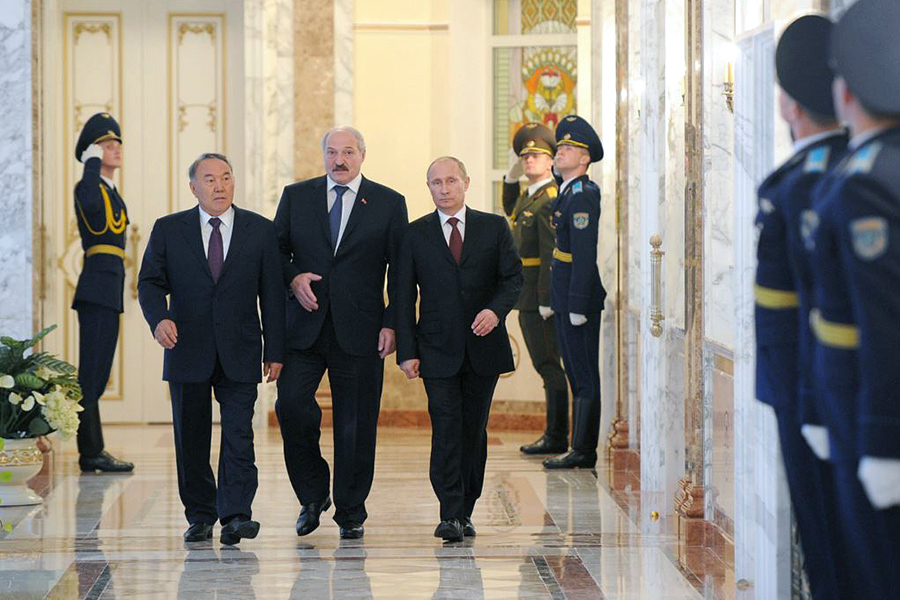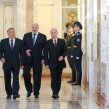
Gray Clouds and Silver Linings—A Net Assessment of the Situation in Belarus Since the Start of 2014
Publication: Eurasia Daily Monitor Volume: 11 Issue: 182
By:

Throughout 2014, four major phenomena have affected Belarus—the war in Ukraine, the formation of the Eurasian Union, a new thaw with the West, and a slowing of economic growth. These phenomena are inter-related. For example, slower growth is, to some extent, caused by Russia’s and Ukraine’s shrinking buying power in conjunction with the Ukraine crisis. Also, the thaw in Belarus’s relations with the West has arguably been caused by geopolitical considerations on both sides. The ongoing war in Ukraine has boosted fears of losing statehood among the Belarus’s political elite and in the West alike; so the Western powers tacitly agreed to put democracy and human rights–related disagreements with Minsk on the back burner.
The events in Ukraine have had the most multifaceted implications for Belarus. Three such repercussions have been most obvious. First, Belarusians, who are well informed through a myriad of informal channels about everyday life in the two other East Slavic countries, Russia and Ukraine, began to value stability at home more than ever before. And they associated this advantage with their government in Minsk. Second, Belarusians began to value their country’s statehood more than before; although an inadequate sense of national identity arguably remains their major vulnerability vis-à-vis putative moves by Russia. Third, Minsk has significantly boosted its stature by adopting a neutral stand in the Ukrainian conflict and by offering the venue for Russian-Ukrainian peace talks. Meanwhile, out of the sixteen most important events of September 2014, which were identified by the Independent Institute for Socio-Economic and Political Studies, nine have involved the various negotiations between Minsk and the West (Infofocus, September 2014). Such activity on Belarus’s Western flank had not been recorded for a long time.
An analysis of the Belarusian economy by Alyaksandr Sinkevich, an independent analyst and business owner, has revealed three negative and three positive trends. The negatives include the effects of a) the war in Ukraine (causing a shrinking trade exchange, flows of refugees, and the threat of technological and other man-made catastrophes); b) the war of sanctions between Russia and the West and c) the industrial stagnation that has already lasted two years. In regard to the sanctions war, Belarus’s position resembles that of the Netherlands during World War I, believes Sinkevich. The country was able to avoid the hostilities and bloodletting but still suffered a setback in its domestic wellbeing (belbusiness.belarusinfo.by via facebook.com/a.sinkevich, October 6).
Paradoxically, the three positive trends Sinkevich points out also include one implication of the war of sanctions: specifically, Belarus’s agricultural exports will be able to partially compensate what Russia declined to purchase in the West, and Belarus’s industry is going to partially replace the Ukrainian contractors that contributed to Russia’s military industrial complex. The second positive development has been Belarus’s new role as a trade mediator between the European Union, Ukraine and Russia—three parties that sometimes decline to cooperate directly due to face-saving considerations. And the third positive has to do with Belarus overcoming the potash crisis of 2012–2013. Just during the first half of 2014, production and export of potash increased dramatically. In addition, in November, in the village of Obchak, 10 kilometers from Minsk, Citroen and Peugeot are launching new assembly lines. Initially, workers at these plants will assemble only 2,500 cars per year, but ensuing sales to the EEC market will result in expansions to these facilities (belbusiness.belarusinfo.by via facebook.com/a.sinkevich, October 6).
On October 9, the Belarusian parliament ratified the three-party agreement about forming the Eurasian Economic Union (EEC)—earlier also ratified by Moscow and Astana. This was a culmination of a lengthy process of mutual coordination among the three partner countries and, possibly, the beginning of a long journey still ahead. Some obstacles on the way to the ratification of the EEC agreement have been overcome to the benefit of Belarus. Specifically, the frontier-free market that the three countries have been ostensibly creating was not without exemptions. For example, Belarus was still required to transfer to Russia’s budget the export duties on refined oil products exported to any country but Russia itself. In 2013, this amounted to $3.4 billion. The duties were to be phased out by 2025. First, Belarus compelled Russia to agree to Belarus reducing its payment by $1.5 billion as early as 2015 (see EDM, May 14). Subsequently, when Russia came up with the idea of the so called tax maneuver—i.e., gradually reducing export taxes on refined oil while increasing the tax on mining (TOM), which includes oil extraction—Minsk stated that this would make Russia’s oil more expensive for Belarus and wrested an even more critical concession. Specifically, already in 2015, Belarus will not transfer any export tax for refined oil to Russia, and further talks will be held to compensate Belarus for the growth in the TOM (Belta, October 10).
Predictably, in the Belarusian opposition media and in parts of the Russian media as well, such a victory by President Alyaksandr Lukashenka was immediately interpreted as the result of blackmail (Salidarnasts, October 8; Proved, October 9). Nonetheless, the fact that Russia has repeatedly made such concessions to Minsk testifies to Russia’s keen interest in the formation of the Eurasian Union and in the realization of the idea, long propagated by some influential Russian analysts, that geopolitical aspirations cannot be satisfied unless they are paid for (Russia in Global Politics, October 22, 2013).
On October 10, Lukashenka proceeded with his diplomatic advancement by presiding over the Commonwealth of Independent States’ (CIS) summit in Minsk and making some provocative statements, notably about the inadmissibility of resolving “the Ukrainian issue somewhere in Berlin or in Milan”—that is, outside the CIS (tut.by, October 10). At the same time, Belarus continued to undermine Russia’s stand on Ukraine. For example, Andrei Makarevich, Russia’s veteran rock star, who has been accused of betraying his country after performing (on August 12) in a part of eastern Ukraine controlled by the Ukrainian army and whose scheduled concerts all across Russia have been cancelled, was allowed to perform in Minsk and Vitebsk. Moreover, the main Belarusian government newspaper praised his concerts and castigated the anti-Makarevich campaign in Russia (Belarus Segodnya, October 6).
The year is still not over, but it is safe to say that Belarus—a country with low international name recognition and a cliché-ridden image—has successfully raised its stature and become a purveyor of good news on several occasions in 2014.




